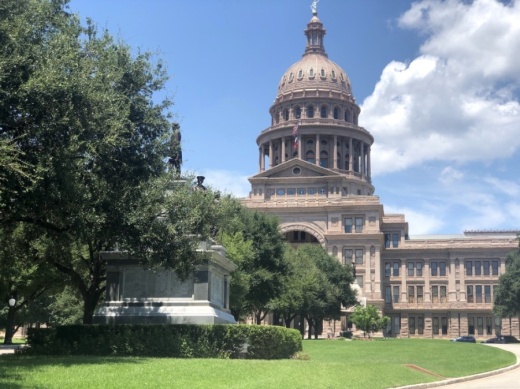A statue of the president of the Confederacy stands in the middle of the Confederate Soldiers Monument, surrounded by four bronze figures representing the Infantry, Cavalry, Artillery and Navy. On the base, the names of the 13 states that withdrew from the Union and famous Civil War battles are inscribed in the stone.
There are other statues honoring the Confederacy on the grounds—memorializing the fighters of Terry's Texas Rangers and John Bell Hood's Texas Brigade—remembering men who fought and died in battle. But after the death of George Floyd in Minneapolis and protests for racial justice across the country, state Rep. Donna Howard, D-Austin, said there is growing momentum around the country to interrogate more carefully the cause those men were fighting for.
"When you dig deeper, what they fought for was slavery and dehumanizing people," Howard told Community Impact Newspaper. "The descendants of the slaves have to look at the same commemorative statues and plaques, knowing their ancestors had been persecuted by those very people."
A group of eight Democrats in the Texas House and Texas Senate signed a letter July 20 calling for the removal of those monuments on the Capitol grounds, along with other monuments and portraits honoring members of the Confederacy. The eight lawmakers, who serve on either the House or Senate committees on Administration and addressed the letter to the committee's respective chairs, also called for the renaming of the John H. Reagan State Office Building, located on the northwest corner of the grounds.
"As a life-long Texan, and descendant of slavery, I join this diverse coalition of my colleagues in the House and Senate as we call for the removal of threatening Confederate imagery from the Capitol grounds," wrote state Rep. Shawn Thierry, D-Houston, in a media release. "The goal is clear: We must ensure that every walkway and hallway of our Capitol is viewed as a safe space for all Texans."
The ultimate decision to remove Confederate monuments from the grounds may fall to the State Preservation Board, which is chaired by Gov. Greg Abbott and is responsible for maintaining the Capitol building and its grounds.
In 2017, after white supremacist and neo-Nazi rallies to protect Confederate monuments turned violent in Charlottesville, Virginia, and began a national conversation, state Rep. Eric Johnson, D-Dallas, called for the removal of a plaque in the Capitol near his office that displayed the "Children of the Confederacy Creed."
The plaque, put in place in 1959, said that the Civil War "was not a rebellion, nor was its underlying cause to sustain slavery."
"Confederate monuments and plaques are understandably important to many Texans. But it is important that the historical information displayed on the capitol grounds is accurate and appropriate," wrote speaker Joe Straus in a letter calling for the removal of the plaque. "The Children of the Confederacy Creed plaque on the first floor of the Capitol does not meet this standard."
In 2019, the State Preservation Board, which includes Abbott, Lt. Gov. Dan Patrick and Speaker of the House Dennis Bonnen, voted unanimously to remove the plaque.
While the previous conversation that began in 2017 revolved around the historical accuracy of the plaque, in 2020, lawmakers are calling for the removal of Confederate monuments not because they are inaccurate, but because of the cause they represent.
"By maintaining idols and symbols of hate we are endorsing their body of work as deserving of high honor. It’s time to remove idols of men who did not love all men, nor did they believe that people of color were created equal by God. There has never been a time so right to do what’s right,” wrote state Rep. Carl Sherman, D-DeSoto, in a media release.
There has also been a shift in public opinion in the last three years, according to polls conducted by the Texas Politics Project at the University of Texas and the Texas Tribune. The poll asked Texans the same questions regarding their opinion about Confederate monuments on public property, but posed the questions three years apart. In October 2017, 38% of poll respondents said the monuments should be removed from view or moved to a museum. In 2020, that number grew to a majority—52%.
The number of respondents who believe the monuments should remain as is with no changes also dropped in the most recent poll as compared to 2017. In 2020, 20% of residents said the monuments should remain unchanged. In 2017, that number was 34%.
Abbott's office, along with state Rep. Tan Parker, R-Flower Mound, and state Rep. Scott Sanford, R-McKinney—both members of the House Committee on Appropriations—did not respond to Community Impact Newspaper's request for comment on this story.





